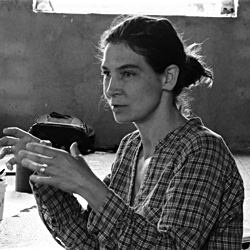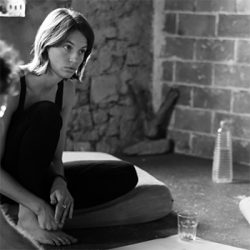Applying participatory methods and systems thinking
In migrant solidarity, climate justice and the work of creating alternatives to the current oppressive and growth hungry system; we are faced with increasingly complex and interconnected problems that require a systemic view and most crucially the participation of all involved to increase our understanding of the plural realities involved. Participation is not only central to create inclusive movements, but also to achieve innovative, adaptive and pertinent solutions coming from minority communities as well as the mainstream. This training is hosted as part of the Ulex South Project
Participation is sometimes experienced as an added extra to enhance a programme or project, or a burden that slows down development, however, it is not participation itself that should be questioned but the approaches, methods, skills and moments in which it is used that we need to consider and get better at. This course aims to share theories, approaches and methodologies to integrate systemic and participatory processes into all stages of our work from research and analysis of the problem to project design and undertaking actions or campaigns capable of adapting to changes in an inclusive quick and efficient manner. One central line of work we will base our week on is Participatory Action Research. A body of work that encapsulates, learning in and about action in iterative and participatory ways designed by participants themselves.
Everyone in a complex system has a slightly different interpretation. The more interpretations we gather, the easier it becomes to gain a sense of the whole. (Meg Wheatley)
We will present those approaches and methodologies that today are innovating and proposing new ways of doing. We will analyze the structural models, theories of change that have been developed by participatory and systems thinking lenses. We will apply these theories, methodologies and tools in our fields of work, our projects and campaigns, to practice, test and reflect on the practice of participatory and systemic change.
We will explore three main approaches and methodologies:
Key elements:
Venue:
This training is hosted as part of the Ulex South Project
Bibiliography:
In the solidarity economy:
(See details of our approach to radical economics here)
Contact us
to apply

Location:
María worked for the Red Cross in community development, strengthening civil society, education, and food security in Latin America and Africa. Building on her studies in social psychology and international development, she studied Alternative Economics at Schumacher College, UK. This led her into work on organisational change with NGOs and grassroots movements. María specialises in complexity and participation applied to organisations: organisational structures and culture, emergent strategy, leadership amongst others. She co-founded The Eroles Project, a learning for action project and La Bolina, a systemic project looking at repopulation, inclusion and agroecology. María´s co-authored: Small is Important: Learnings from an integration and regeneration Project. Factores Clave para la Acción Reflexión Colaborativa, Enfoques y herramientas participativas en la cooperación al desarrollo, Activism and spirituality.

Location:
Ruth Cross is co-founder of Eroles Project – an international learning for action centre, and, Asociación La Bolina – a visionary intercultural initiative working to regenerate land and lives through creating social integration and sustainable livelihoods for locals, migrants and refugees in El Valle, Andalucia, Spain. She is the Artistic Director of Cross Collaborations, an award winning arts for change immersive theatre company.
Ruth is an experienced arts activist, social theatre maker, researcher and educator specialising in instigating transformative and regenerative change. She can be found directing immersive performance with migrants and refugees, creating participatory arts action campaigns and coordinating cross-disciplinary projects with organisations, decision-makers, civil society and local communities.
For the last 10 years Ruth has facilitated capacity building training with activists and social movements. She is a research contributor with Schumacher Research in Action community, is a member of the international Delicate Activism community and of Social Arts network ImaginAction. As well as a collaborator with Asociación Solidaria Andaluza de Desarrollo (ASAD).

Location:
An Maeyens (she/her) is a facilitator and trainer with over two decades of experience in grassroots movements. She specialises in creative, inclusive agenda design and brings deep expertise on group culture, power dynamics, and transformative learning. Starting of in the anti-globalisation movement she has trained thousands in civil disobedience, supported international coalitions, and developed multilingual training programmes and toolkits. Her work spans movements, cultures, and countries, guided by a commitment to care, accessibility, and leaderful organising.

Location:
Ari’s activism began in 2002, at age 16, as a Bosnian refugee in Canada, where they founded and coordinated a group for LGBTIQ high school students and allies. They were a co-founder and leader at kolekTIRV in Croatia and Trans Network Balkan, involved in community organizing, advocacy, program management, team coordination, capacity building, education, media work, campaigns, events, fundraising, etc. In 2024, they joined the Supervisory Board of the Croatian Trade Union Collective of United Precarious Workers and Activists (SKUPA).
Beyond the Balkan region, Ari served as a Board member at Transgender Europe (TGEU), where they held roles as Secretary, Treasurer, and later Co-chair. They have also been a trainer with the Center for Artistic Activism and served on the Advisory Committee and since 2022 as a Community Care Facilitator at FRIDA — The Young Feminist Fund. Since 2024 they are the Operations Manager at Global Philanthropy Project.

Location:
Sergio (all pronouns) was born in Romania and migrated to Germany in the early 2010s. In the past, he was a social worker with homeless people and a social consultant for Eastern European migrants for various organisations. Trained as a filmmaker, he spent two years making a documentary about the ‘civic reawakening’ in Romania and the waves of protest it brought with it. In connection to this, Sergio is currently co-steering the development of an online open-source participative knowledge production platform on activism in Romania. Over the past nine years, Sergiu has offered his skills to various journalists, grassroots collectives and campaigns, mostly working within the labour rights, climate justice, international solidarity and anti-authoritarian movements in Germany and Romania. Nonetheless, his biggest focus since 2020 has been his work as an organiser with the anarcho-syndicalist Free Workers Union, where he focuses mostly on organising Romanian migrant workers on construction sites, in factories and in the agricultural field.

Location:
Linzy Na Nakorn is a movement director, politicised somatics practitioner, community organiser and facilitator. For the past decade she has been facilitating movement, body work and creating theatre, dance and participatory performance that advocates for and organises with communities in pursuit of housing, disability and racial justice. Her movement practice focuses on trauma-informed approaches to building resilience, capacity and joy via way of the body for personal, interpersonal and community sustainability. Linzy was a Co-Director of The Big Ride for Palestine in partnership with The Gaza Sunbirds, Native Woman Ride and Middle East Children’s Alliance; using cycling as a tool for mobilising active solidarity and in support of campaigning for the rights and self-determination of the Palestinian people. Linzy is part of a UK network of activists and artists advocating for Radical Care – supporting organisations, researchers and institutions to work towards system change in societal approaches to labour, leadership and access.

Location:
Jeroen (he/him pronouns) has been involved in grassroots social movements for more than two decades now, starting back when he was fifteen. Throughout the years the fights for “climate justice” and “migrant justice” have been consistently on top of the list of struggles that make his heart beat faster. A key transformative moment for Jeroen was reading Paulo Freire’s Pedagogy of the Oppressed. Freire’s revolutionary pedagogy gave him a language to support the creation of emancipatory learning environments, rooted in a desire for collective liberation. Jeroen has also been exploring in depth Boal’s Theatre of the Oppressed and Joanna Macy’s The Work That Reconnects among other methodologies to build his trainer’s toolkit. Inspired by the liberatory possibilities of these traditions, he started an organization with a friend, LABO vzw, based in Belgium, where he has worked as a trainer and campaigner between 2013 and 2023.

Location:
Ella brings more than 10 years’ external experience working with not for profit and community based organisations across diverse themes including: advocacy for migrant communities; local community engagement in national policy making; and structural relationships between poverty and disenfranchisement, and education and poverty. Immersed in critical theory in her early 20s she brings a holistic and questioning approach, and is passionate about systemic solutions that centre relationship and interconnection between ecology and society. A long standing member of the collective, Ella has been part of the core team since the inception of the Ulex Project. Her work bridges facilitation, developing project partnerships, governance, strategy, operations, and project and programme evaluation. She has developed and overseen more than 70 partnerships with a range of different actors across European social movements.
Ulex: Latin (argelaga Catalan, gorse English) noun:
1. A thorny-evergreen flowering shrub, with a high capacity for regeneration and resilience. Its seedpods open in contact with fire and it reshoots from charred stumps. A successionary plant that grows well under challenging conditions. It improves soil fertility through nitrogen fixing, preparing the way for renewed biodiversity.
2. A traditional choice for igniting fires. Burns hot and bright.
3. A networked project adding nutrition and fertility to European social movements through training and capacity building. It kindles the realisation of social justice, ecological intelligence, and cognitive vitality.